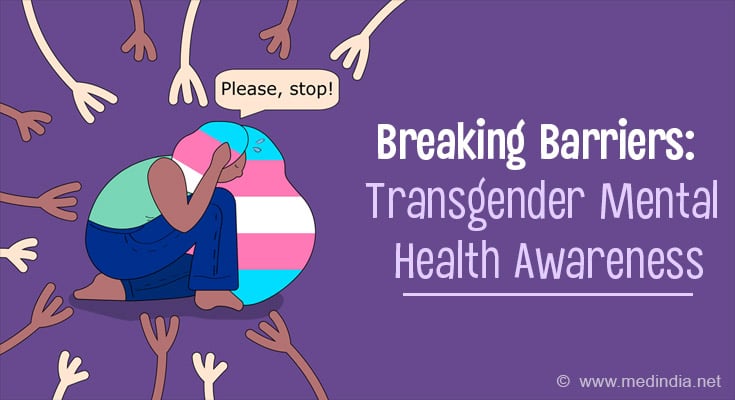- Transgender individuals face higher rates of depression and anxiety compared to the general population
- Gender-affirming surgeries and therapies play a critical role in alleviating gender dysphoria and improving mental health outcomes
- Supportive networks, therapy, and self-care practices are essential for promoting mental well-being in the transgender community
Transgender individuals experience a profound misalignment between their gender identity—their innate sense of self—and the sex they were assigned at birth. This can lead to significant distress known as gender dysphoria. It’s essential to recognize that being transgender is not a mental illness; however, the challenges and discrimination they face can contribute to mental health concerns (1✔ ✔Trusted Source
Gender Dysphoria and Suicidal Ideation: Clinical Observations from a Psychiatric Emergency Service
).
TGNC, an acronym for transgender and gender non-conforming, encompasses a diverse range of individuals whose gender identity differs from their birth-assigned sex. This inclusive category includes transgender men, transgender women, non-binary individuals, gender-fluid individuals, and genderqueer individuals. TGNC individuals navigate societal expectations that may not align with their authentic selves, highlighting the need for understanding and support in promoting their mental well-being.
Advertisement
Mental Health Challenges Among Transgender and Gender Non-Conforming Individuals
Transgender individuals face significantly higher rates of mental health disorders compared to the general population, largely due to societal stigma, discrimination, and the internal struggle to align their external appearance with their true gender identity. This disparity often leads to anxiety disorders, depression, and other related issues that exceed prevalence rates seen in non-transgender populations (2✔ ✔Trusted Source
Mental Health Diagnoses Among Transgender Patients in the Clinical Setting: An All-Payer Electronic Health Record Study
).
Gender dysphoria, characterized by persistent distress stemming from incongruence between one’s gender identity and physical attributes, can result in profound emotional and psychological challenges. Transgender individuals grappling with gender dysphoria often experience anxiety, depression, low self-esteem, and social withdrawal. Discrimination and rejection from family, peers, and society further exacerbate these mental health struggles.
Based on recent research findings, transgender and gender non-conforming (TGNC) individuals face disproportionately high rates of mental health challenges, including depression, anxiety, suicidality, self-harm, substance use disorders, stress-related disorders, and social risk factors.
1. Depression
TGNC individuals are at a higher risk of depressive symptoms, with rates ranging from 32.0% to 54.5%. Factors such as childhood maltreatment, school bullying, low self-efficacy, and low self-esteem contribute to depressive symptoms. Depression is associated with negative impacts on mental health outcomes, including increased suicide ideation and risk of suicide attempt.
2. Anxiety
TGNC individuals experience higher rates of anxiety disorders (28.5% to 51.0%). Anxiety is linked to various factors including sexual behavior, discrimination, lack of social support, and desire for gender-affirming hormone therapy.
3. Suicidality and Self-Harm
Prevalence of suicide attempt ranges from 11.1% to 25.7% and suicide ideation from 12.7% to 50.0% among TGNC individuals. Suicide risk factors include depression, victimization, minority identity, and lack of access to gender-affirming treatments.
Self-harm behaviors are also prevalent, with rates of self-harm attempt around 21.6% to 22.7% and self-harm ideation from 32.3% to 44.7%.
4. Substance Use and Addiction
Substance use disorders are comorbid with other mental health issues, such as depression and anxiety, especially among TGNC individuals engaged in sex work.
5. Stress-Related Disorders
TGNC individuals face chronic stressors related to gender minority identity, including discrimination, victimization, and lack of social support. Psychological distress, PTSD, and other stress-related problems are prevalent among this population.
6. Social Risk Factors
Low utilization of mental health services among TGNC individuals due to perceived discrimination and lack of access to gender-affirming treatments.
Unmet needs for gender-affirming medical resources contribute to mental health disparities.
7. Minority Stress Model
The minority stress model explains the impact of chronic stressors on physical and mental health outcomes among sexual and gender minorities. Discrimination, lack of social support, and barriers to healthcare access contribute to mental health disparities in TGNC individuals.
These findings underscore the complex interplay between mental health and various social, environmental, and personal factors experienced by TGNC individuals, highlighting the need for comprehensive and culturally competent interventions to support their mental well-being.
Advertisement
Gender-Affirming Surgeries and Treatments
Gender-affirming surgeries and treatments are crucial for alleviating gender dysphoria and improving mental health outcomes. These procedures include chest surgery (for transmasculine individuals), breast augmentation (for transfeminine individuals), phalloplasty, vaginoplasty, and facial feminization surgery. These surgeries help align physical characteristics with gender identity, reducing distress and enhancing self-confidence (3✔ ✔Trusted Source
The mental health of transgender and gender non-conforming people in China: a systematic review
).
The affordability and accessibility of gender-affirming surgeries vary significantly across different countries. Turkey, Brazil, and Argentina are notable for offering more affordable options compared to countries like the United States. However, disparities in healthcare access and legal barriers can prevent many transgender individuals from accessing these life-changing procedures.
Advertisement
Consequences of Limited Access to Gender-Affirming Care
The denial of gender-affirming treatments due to cost or legal restrictions can have dire consequences. Without access to essential medical care, transgender individuals may experience persistent dysphoria, worsening mental health issues, and a diminished quality of life. This lack of access contributes to increased rates of anxiety, depression, and suicidal ideation within the transgender community.
It’s imperative to prioritize mental health support and access to gender-affirming care for transgender individuals. Cultivating a supportive environment, advocating for inclusive policies, and promoting equitable healthcare access are essential steps toward improving mental health outcomes and ensuring the well-being of transgender communities worldwide.
Holistic Approaches to Mental Health for Transgender Individuals
Coping with mental health issues is essential for transgender individuals facing the challenges of gender dysphoria, societal stigma, and discrimination. Here are some healthy ways for transgender people to manage their mental health:
1. Seeking Support
Connect with supportive friends, family members, or peers who affirm your gender identity. Building a network of understanding individuals can provide emotional validation and reduce feelings of isolation.
2. Therapy and Counseling
Consider working with a mental health professional, such as a therapist or counselor, who has experience with gender identity issues. Therapy can provide a safe space to explore emotions, develop coping strategies, and address mental health concerns.
3. Joining Support Groups
Participate in transgender support groups or online communities. Sharing experiences and insights with others who understand your journey can foster a sense of belonging and reduce feelings of loneliness.
4. Self-Care Practices
Prioritize self-care activities that promote mental well-being, such as mindfulness, meditation, yoga, or deep breathing exercises. Taking time to relax and focus on self-compassion can reduce stress and anxiety.
5. Physical Exercise
Engage in regular physical activity, such as walking, jogging, or dancing. Exercise releases endorphins, which can improve mood and alleviate symptoms of depression and anxiety.
6. Healthy Lifestyle Choices
Maintain a balanced diet, get adequate sleep, and avoid substance abuse. Nourishing your body with nutritious foods and prioritizing rest can positively impact your mental health.
7. Creative Outlets
Explore creative expressions like art, music, or writing as a way to channel emotions and self-expression. Creative activities can be therapeutic and serve as a healthy outlet for processing feelings.
8. Setting Boundaries
Establish boundaries with unsupportive or toxic individuals. Protect your emotional well-being by limiting exposure to negativity and surrounding yourself with affirming and respectful people.
9. Educating Yourself
Learn about gender identity, mental health, and available resources. Knowledge empowers you to make informed decisions about your health and advocate for yourself within healthcare settings.
10. Accessing Gender-Affirming Care
If appropriate and accessible, consider pursuing gender-affirming treatments such as hormone therapy or surgeries. Aligning your physical body with your gender identity can alleviate dysphoria and improve mental health outcomes.
It’s important for transgender individuals to prioritize their mental health and seek support when needed. Each person’s journey is unique, and finding effective coping strategies may require experimentation and self-discovery. By nurturing emotional resilience and fostering a supportive environment, transgender individuals can cultivate positive mental health and thrive authentically.
Transgender individuals face unique challenges related to gender dysphoria and mental health. Access to gender-affirming care, including surgeries and therapies, is crucial for alleviating distress and improving overall mental health and quality of life. By fostering acceptance, advocating for equitable healthcare, and addressing systemic barriers, we can promote the mental health and well-being of transgender individuals and create a more inclusive and supportive society.
References:
- Gender Dysphoria and Suicidal Ideation: Clinical Observations from a Psychiatric Emergency Service – (https://www.ncbi.nlm.nih.gov/pmc/articles/PMC6903884/)
- Mental Health Diagnoses Among Transgender Patients in the Clinical Setting: An All-Payer Electronic Health Record Study – (https://www.ncbi.nlm.nih.gov/pmc/articles/PMC6830528/)
- The mental health of transgender and gender non-conforming people in China: a systematic review – (https://pubmed.ncbi.nlm.nih.gov/34838199/)
Source-Medindia



